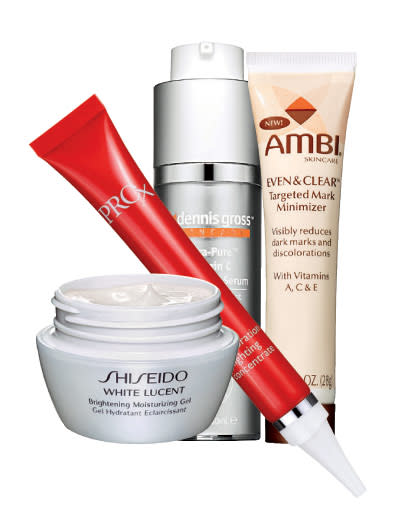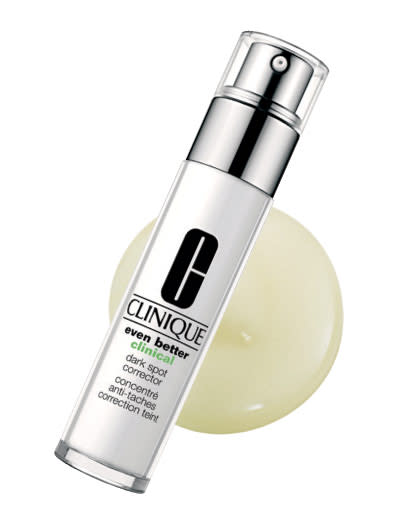Dermatologist Tips for Uneven Skin Tone
From high-tech lasers to topical creams, doctors reveal how to make pigmentation a thing of the past
It's possible to fake flawless skin with foundation, but wouldn't you rather not have to? Whether you rely on a high-tech laser or a lo-fi topical cream, with the right plan, you can erase pigmentation, and-yes!-make cover-up optional. The first step? Identify your pigmentation's provenance: "Diagnosis is crucial," New York City derm Dennis Gross, MD, says. "Not only is the right treatment key, the wrong treatment can make discoloration darker."

ANATOMY OF A BROWN SPOT
Not all dark spots are created equal: They stem from three sources. UV exposure can trigger a growth of excess skin cells called solar lentigo, aka sun spots, liver spots, or age spots. The cells, pigmented with melanin, cluster together, forming a circular mark a few shades deeper than your skin tone. Estrogen fluctuations due to pregnancy or birth control pills stimulate melanocyte cells to work overtime and create melasma, unwanted pools of melanin in the skin; unlike sun spots, these patches don't stay confined to a nice circle. And injuries such as a curling-iron burn or a swollen pimple can also jump-start melanin production (especially in Asian, Hispanic, or black skin), leaving a stubborn mark called post-inflammatory hyperpigmentation (PIH).

SCREEN SAVER
Slather on sunscreen to stop spots from darkening, and-even better-prevent new ones from forming. Prone to melasma? Minimizing UV exposure will prevent flare-ups. "Even small amounts of unprotected sun exposure can make pigmentation worse," Scottsdale, AZ, dermatologist Jennifer Linder, MD, says. Stick with a hypoallergenic version (try Neutrogena Sensitive Skin SPF 60 Sunblock Lotion), free of irritating chemical blockers such as avobenzone or oxybenzone.

SEE SPOT RUN
"All pigmentation will respond to topical bleaching creams," Kansas City, MO, derm Audrey Kunin, MD, says. "The most commonly used bleaching agent is hydroquinone, which stops melanin production and speeds up the exfoliation process." The ingredient is controversial-high potency, long-term use can cause a bluish black discoloration of tissue, and studies have shown extreme doses to be potentially carcinogenic. (That said, insane levels of almost anything, from vitamin E to pickles, can be linked to carcinogenic activity.) The American Academy of Dermatology stands behind hydroquinone's decades-long record of efficacy and safety, and derms continue to praise results. Still wary? Try botanical-packed Clinique Even Better Clinical Dark Spot Corrector, which rivaled hydroquinone in the company's clinical trials.

PEEL POWER
Both Linder and Gross recommend monthly in-office peels to exfoliate the epidermis, remove superficial pigment-packed cells, and hasten the effects of topical products. But Gross warns against bleaching peels that claim immediate depigmentation results. "You need long-term exposure to an active ingredient to reap the benefit; a short period of time is not going to be effective," he says. For small PIH marks, try an at-home glycolic peel like Gross's own or Cane + Austin Retexturizing Treatment Pads. Both reduce fine lines and correct discoloration.

LASER TAG
Ironic? Yes. Zapping a UV-induced solar lentigo with light can usually erase the mark. "The Q-switched YAG laser is perfect for sun spots," Gross says. "Its light wave is absorbed by the brown color without affecting surrounding skin." This onetime in-office treatment targets the spot, leaving a thin, crepey scab that flakes off in days. But melasma and PIH patients should steer clear. "Studies have found melasma to be unresponsive to or exacerbated by laser and intense pulsed-light treatments," Linder says. "The heat and inflammation can trigger new pigment production." A 2006 Journal of Cosmetic Dermatology article agrees: "Successful laser treatment for melasma is the exception, rather than the rule," author David Goldberg, MD, says.

Read More From ELLE
Beauty It List: The Top Fall Makeup Products
The Top Celebrity Slimdown Programs
Kate Hudson's Hair Color Secrets
